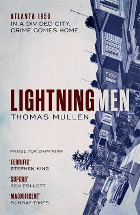Lightning men by Thomas Mullen

Little, Brown, 2017. ISBN 9781408710623
(Age: Senior secondary-adult) Highly recommended. Themes: Crime,
Atlanta, USA, Historical novel, Racism, Jim Crow laws. Atlanta,
Georgia in the 1950's is laid bare for all to see in this stunning
new crime story by Thomas Mullen.
Listening to him at the recent Adelaide Writers' Week ensured buying
the book, finding another friend already had his first book, Darktown
(2016), set in Atlanta just two years before, and exposing the
conflicts within the police department, only just admitting eight
Negro policemen. For many, this is the last straw, and those in the
force who are Klansmen or who sympathise with their aims, make sure
these newcomers never forget their place. They are only allowed to
patrol the Negro neighbourhoods, not allowed to arrest white men,
and for Boggs and Smith, coming across a drug transfer, which
results in the death of a white man, the consequences prove to be
dangerous.
This is an unequivocal look at 1950's USA, where Negroes returning
from Europe after World War Two, enthused by the freedom and
responsibility they had as soldiers, expect better treatment back
home. But for many it is back to being the lowest paid workers,
ineligible for GI loans to buy a house, few opportunities, living
under the Jim Crow Laws and the overarching racism of the Ku Klux
Klan and its offshoot, the Columbians (the Lightningmen) to deal
with. For the lucky few able to buy a house in the transition areas
where Negroes are buying into white areas, notices appear on the
street poles, vicious letters are sent to their homes, some are
beaten and neighbourhood groups mobilise to keep them out.
For Tommy Boggs his life as a policeman and as a family member come
together when his girlfriend's ex lover turns up newly released form
jail, stretching Bogs' belief in her. He tries to find out more
about Jeremiah but attracts the attention of the federal agency.
And his investigations collide with a sympathetic white detective,
Rake when his brother in law admits to doing the bidding of a
klansman, resulting in a death.
In Rake's neighbourhood, his wife is happy to support a group
collecting money to buy the Negro family out and one night when this
money is stolen, all blame is leveled at the Negro household, where
Smith's sister lives.
Rake follows the clues from afar, realising that the men who stole
the money were much closer to home, but proving this means defending
the Negro household, raking up the ire of his brother in law.
Calling to see his sister's husband, the last chapters of the book
bring all the threads together as Rake becomes involved in a shoot
out in the white neighbourhood.
A gritty crime novel, the moral edges are blurred as each of the
main protagonists both white and black make decisions which cause
them grief and sleepless nights.
The novel gives an amazing insight into the issues of Atlanta at
this time, and reflects serious research into the times through
archives and newspaper accounts. It was reading one such newspaper
article about Negro police being appointed in Atlanta that started
Mullen on this series of books.
Not only does this book reflect the division between black and white
in the USA of the time, it will impel Australian readers to think
about such injustice here.
Fran Knight